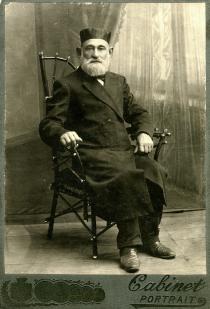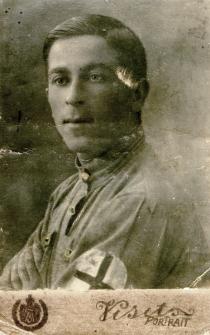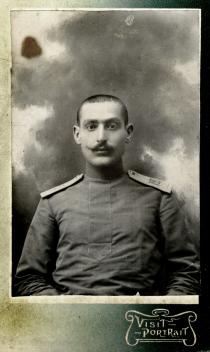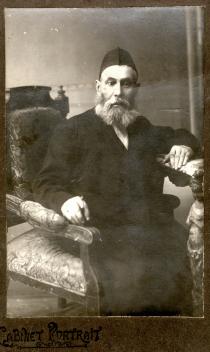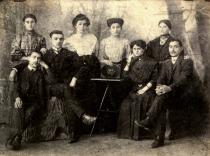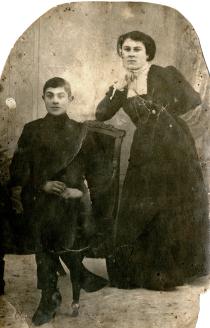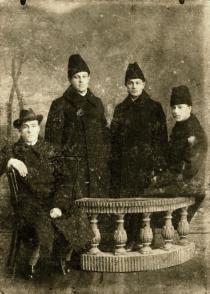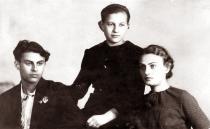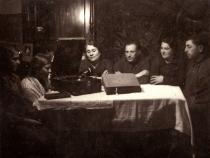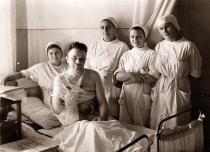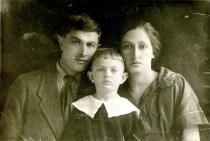
Faina Khorunzhenko
Kiev
Ukraine
Interviewer: Zhanna Litinskaya
Date of interview: November 2001
Family background
Growing up
During the War
After the War
Glossary
I remember my grandfather, my father's father, very well. His name was Pinkhus Yakovlevich Levinson. He was born in the middle of the 19th century, and died at the age of 77, in 1927. I never knew my grandmother - my father's mother - because she died at a very young age. My grandfather was a very good tailor. To the full measure of his abilities he was trying to provide his children with education. My grandfather lived with our family - my mother, my father and me in Novoukrainka [at that time it was Odessa region, today it is Kirovograd region]. My grandfather was very religious. He went to the synagogue every day, spoke Yiddish and kept all Jewish traditions.
He had six children: the oldest brother Yakov, my father Lev and his brother Yevsey. His brother Yakov died tragically. His friend was a gun maker, and they played with his guns, and he said, 'I'll shoot you now', being absolutely confident that the gun was empty. He shot and killed him. A young widow and a two-year-old child were left behind. The middle brother, Yevsey, served in the Soviet Army. He selected horses. He was also in the Soviet Army during World War II, and he lived in Novoukrainka after the war.
My father was born in Novoukrainka in 1885. He graduated from the College of Commerce. His sisters, aunts Sonya, Lyuba and Manya, received an education, which was considered very good for women. They graduated from something like a pro-gymnasium, a junior course, because it was very hard for Jewish children to get accepted into a school, even a private one. That's all I know about them.
I never knew my grandparents on my mother's side because they died before I was born. My grandfather was called Moisey Zamb. He died at the beginning of 1916, while grandmother Pesya died back in 1911. They lived in what today is the town of Pervomaisk. It used to be called Golta. This city consists of three parts - Golta, Bogopol, and Olveopol. My mother was born there. My grandfather had his own house. They were quite rich because my grandfather - even though it sounds strange for that time - was a manager for a rich landowner and industrial businessman. They had a large family - seven children.
Their oldest daughter was Tanya; I don't know when she was born. Her husband, Mikhail Kizman, fought in the Russian-Japanese war. He was involved with the Social Democrats. One officer in Manchuria [China] warned him that if he did not hide, he would be arrested and judged by the military tribunal for agitating against the war. Mikhail managed to escape. I don't know how, but his first stop was New York. Somehow he let his relatives know that he was still alive. Then he moved to Argentina, where aunt Tanya and her two little children also moved in 1906. Aunt Tanya wrote to us. Despite the fact that they lived a good life, and their children received a very good education, my aunt was obviously nostalgic. She missed her motherland for the rest of her life. We lost contact with her during the war.
The second sister was Dina. Aunt Dina died in 1924 or 1925 of cholera, which was the only case in the little town near Odessa, where she lived. She left three children behind: two daughters, Sonya and Zhenya, and a son, Bentsion. My mother also had brothers - Mikhail, Grigory, and Ruvim. She also had a sister. I don't remember anything else.
My mother was the youngest. She was born on December 12, 1890. Her name was Olga Zamb. After the death of my grandfather, my mother's older brother, Grigory (who fought in World War I and was demobilized in 1916 due to a wound, after which he found a job in Pervomaisk), took my mother into his own family. But my mother didn't like it there because Grigory's wife Asya had no love for her. Then the husband of her sister Sonya, Bentsion Brodsky, took my mother to Novoukrainka, where she lived from 1916. I don't know any details, she only said that she didn't like living there.
It was there that she met my father. My father, Lev Levinson, was five years older than my mother. He courted her for a very long time - more than a year and a half. They married, and lived with grandfather, and then I was born on 1st May 1920. We didn't have our own house, so we always rented houses or apartments. I remember our last flat: it was big, with three rooms and two kitchens - a warm one and a summer one; there was a dining room, my parents' bedroom, my grandfather's room, and the smallest room for me.
During the Soviet times my father worked as an economist in the system of central work cooperatives. Our financial situation was not bad: there were no super incomes, but it was enough for us to live on. I had a good fur- coat for winter, and many different dresses - woolen and velvet. My mother also had very good clothes, and my father was even called a dandy. He was very elegant.
Back then people bought everything in private stores. It was the New Economic Policy 1. Lenin introduced it after 1921. Private capital was allowed in commerce and light industry but not in heavy industry. My mother didn't work anywhere; she was a housewife. In the morning she made breakfast for my father and saw him to the door; then after feeding my grandfather and me, she took me for a walk or shopping. We had no servants, so she did all the housework herself.
My grandfather and my father were very religious. We kept every Jewish holiday in our house; I especially remember Passover. My grandfather always wore a yarmulka; he also had a beard and small payes. He was religious, but not fanatically. He observed the Sabbath, on this day he prayed and wore a tallit. My father and my mother went to the synagogue. I don't remember how often they did that, but they definitely did. There were a lot of Jews in Novoukrainka, which is why they had a synagogue there. They had no special Jewish streets: Jews, Ukrainians, and Russians all lived in one neighborhood, and were on good terms. My parents had a lot of friends, both among the Jews and other nationalities.
In general, relations between the different nationalities were complicated. I would like to tell you one story. It was in the south of Ukraine, and during the Civil War [1918-1921] there were a lot of atamans there. [Ataman is a Cossack chief; Russian term for the leader of an armed band.] I knew the family of Kolya Medvedev. I went to school with him. His grandfather and father were bakers. His grandfather had another son, who was 18 during the Civil War. So, as usual, at such an age, heads were hot. Once ataman Grigoryev sent somebody to gather gangs together to pogrom the Jews in Yelisavetgrad. He decided to go with him, but got drunk, couldn't get on the train and fell under it. People rescued him, but both his legs got cut off. So later, when all kinds of gangs would attack that town, people said the doors of Medvedev's house would open widely for the Jewish families with children to run there and hide. Old man Medvedev would take an icon and his handicapped son, stand in the doorway of his house and tell the gangs, 'First, beat up this icon, then beat up me and my son, and only then will you enter my house'. Thus he saved as many Jews as he could. But I cannot tell you if everyone acted like him.
During the Civil War, my father's neighbor betrayed him, and my father had to spend two days at the camp of Denikin 2. Then they took him to be shot. I don't know why, but there was another man, a Russian, who was about to be shot as well, Vladimir Ivanov. Denikin's gang was retreating - the troops of Kotovsky attacked them. [Kotovsky was a famous Red Army commander.] My father crawled to the house, called, but my mother could not open the door, because it opened to the outside. My father fell in front of it, and his body wouldn't allow the door to open. Anyway, she opened the door somehow, stepped over my father, and ran to get a doctor. The doctor, Mikhail Mikhailovich Mikhailovsky, lifted my father up and helped him come to his senses. As he was leaving, my mother asked him, 'What's wrong with Lyova?' He hugged her and said, 'Daughter, he has the heart of a 100-year- old man'.
After that, my father only lived for seven more years. I can say that I received his last breath. I went to school at the time, in 1927, because my father knew that he was dying and he really wanted me to study. So he asked his good friend, who was a school director, to accept me earlier than they usually did. On that day I stayed at home - for some reason my mother didn't let me go to school. My father was in bed, and I was sitting in another room, drawing. Suddenly he called me and said, 'My dear daughter, let me kiss you'. I gave him my lips, and he said, 'Do not kiss me on the lips for they are already dead'. He kissed my forehead, and was gone... It was 3 p.m. on 5th October 1927. I saw my father when he was wrapped in his tallit, if I'm right, but I wasn't present when he was being taken out of the house. I only know and remember that my mother sat on the floor and slept on a carpet for seven days, just as she should...
My grandfather said, 'Lyova, you will not stay there alone for long, I'll join you soon'. And six weeks later he also died. I didn't attend his funeral, because he had sent my mother and me to his sister in Pervomaisk, having said, 'They've had enough deaths and funerals'. Before his death he made my mother's sister promise that if my mother wanted to get married again, she should be allowed to do so. But even with this oath, my mother could never forget her husband and never married again. From the age of 27 she remained a widow. I had no brothers or sisters.
Being a widow, my mother studied medicine, graduated and worked as a medical assistant to a surgeon for nearly fifty years. After the death of my father and grandfather, my mother and I lived with her sister and her sister's husband. They had no children and loved me as their own daughter.
I continued to go to school. It was a Ukrainian school. There were a lot of Jews in our class, but we really never thought about who was who. It was simply not on our minds. There was a Jewish school in town, and when we were in the fourth grade we, the Jewish kids, were almost transferred there by force. We didn't want to go there because we didn't know the language and didn't want to be bad students.
In the family, I always spoke Russian, even with grandfather and father; I understood Yiddish, but it wasn't enough. Back then I began to take German classes with a tutor outside school; I knew that language pretty well. I liked going to school very much. I was a true Soviet child. We celebrated all kinds of holidays in a beautiful way; we had special sports parades, and 1st of May and October Revolution Day 3 demonstrations. By the way, we didn't only celebrate Soviet, but also other holidays; for instance, we had a very nice celebration of the Paris Commune Day. I was dressed as Marianna, a symbol of the French Revolution, and older boys carried me in their arms, while I held a flying French flag in my hands.
In the summer of 1934, we moved to Sumy for good. It happened because uncle Mikhail, with whose family we lived, had been transferred to Sumy for work. In Sumy I also went to a Ukrainian school; there were no Jewish schools there at the time. I was certainly a young pioneer, and, later a Komsomol 4 member. At our school we had a wonderful drama course. I studied there for three years and received a certificate on graduation. It meant that I could continue my theatrical career. But none of my friends from the studio took advantage of this opportunity. We staged both classical and modern repertoire. With great enthusiasm we marked the 100th anniversary of Alexander Pushkin's death by staging one of his plays. Very often we gave concerts and performed plays during the lunch breaks in workshops of big factories.
There were many Jewish boys and girls, approximately one third, in our class in Sumy. But I only started to think about it as a grown-up; we never paid attention to any nationalities back then. Everybody gathered at our house. My mother was never interested in politics, but she was a true patriot, loved her country and her people and did her noble job of helping people as much as she could.
There was a synagogue in Sumy. My uncle and aunt went there, but my mother did not. On Passover, when we could not buy matzah in Sumy, my aunt made it herself. Our family celebrated big traditional holidays, both before and after the war.
I finished school in 1938. But as they said, we were unlucky, because in 1937, the Stalinist repression started, and many teachers of our school were arrested. [The interviewee is referring to the Great Terror.] 5 We could never get the whole picture and believed everything we were told. All the teachers of the basic subjects at our school had been arrested. Somebody put 'B's' into all our high school certificates, so that we would have some grades, but not be able to get special golden medals [for graduation with honors from high school], which would have enabled us to enter institutes and universities without exams. But in general, all the students who studied well entered institutes, including Jews. Moreover, when I was already a student of the Sumy Teachers' Institute, I was rewarded with Stalin's scholarship, which was introduced in 1939 in honor of Stalin's 60th birthday. This scholarship was worth 700 rubles, while the regular one was only worth 250 rubles.
I was always interested in history, and I studied at the history department of my institute. At the end of the 1940s we already knew about Hitler's rise to power: mostly from the case against Georgy Dimitrov 6. Besides, we watched two wonderful movies - The Oppenheim Family and Swamp Soldiers. Back then we knew about Hitler's attitude towards Jews, about destroyed stores, persecutions and concentration camps. [Editor's note: It is unlikely that they already knew about concentration camps at the time, so the remark is probably a retrospective memory.] And when the Molotov- Rippentrop Pact 7 was signed we all supported it, and even now I believe it was necessary.
In general, our family feared the war back in 1939. My mother was first called up in September 1939, when our troops entered Poland. I was on my way from a health center in Odessa at the time, and outside Kremenchug all passengers were taken off the train, because all the trains were supposed to serve the military. We all had to get home on other trains. When I came home, my aunt met me in Sumy, because my mother had been called up by that time. It was around September 14. They said there were no victims in that campaign. I don't know about the dead, but there were many wounded for sure.
I remember the day when war broke out [on 22nd June 1941]. I was preparing for an exam on the history of the Ukraine and was reading Grushevsky's book - a big volume with a leather cover. Now people say that Grushevsky was banned in the Ukraine, but back then we all studied his books. I was sitting on the porch, holding the book on my knees. The window was open towards the porch, and I could hear the radio. Suddenly, I heard the word 'fascists'. I did not react because I thought I had misheard something. And then I heard 'they attacked...', and it was already Molotov's address. I jumped up, and the book fell on my feet - I had two bruises on my feet for a long time afterwards. The building of our institute was immediately transformed into a hospital.
On 23rd June my mother was called up again; her passport and military ticket were taken away from her, and she was sent to set up the hospital. I passed my exams, then went to the hospital chief, Grigoriy Isaakovich Kanevsky, and told him, 'I will help you'. He ordered me to set up the hospital library. Soon, the first wounded soldiers began to arrive. I helped to admit them and with everything else that was needed. Thus, I began to work as a librarian, first on a voluntary basis and then as a staff member; later I worked as the chief of the hospital club. But the hospital did not stay in Sumy for long: it was evacuated on 12th August 1941.
It was a long ride. At the Kharkov railway crossing we were heavily bombed. We were kept in a heated goods van. But thanks to our hospital chief, we were not hungry, because he brought enough food along. We came to the town of Gorky and got settled in the House of Councils. We all lived in one room, slept on mats, ate on mats, made tables of mats, so we lived with 'soft furniture'. Then the hospital was moved to the town of Semenov, not far from Gorky. Later, my job as a hospital librarian was reduced, and the district committee of Komsomol sent me to another place as a free secretary. There I joined the Communist Party.
In October 1943, after Sumy was freed from the fascists, I wrote a letter to my institute. I got a reply from its director, Zaitsev, who wrote that the history department was in operation. And, in October 1943, I returned to Sumy. My mother who was subject to the draft, my uncle and my aunt remained in Semenov.
When I came back to Sumy, I learned that the Germans had shot all Sumy Jews - a total of 186 people. The rest managed to evacuate from their homes. There was no special evacuation for Jews, they left on their own. Then Jews from the whole Sumy region were evacuated, and after the liberation of Sumy the remains of everyone who was found were buried in the cemetery, and a large tombstone was put on top of the grave.
Our family lost my uncle, the husband of my father's younger sister - he perished in the battle of the Dneper River. At the Leningrad front my favorite cousin Moiseika Shakhnovsky was killed. My cousin's husband, Leonid Savitsky, was killed outside Moscow, and the fascists shot my cousin's youngest son in Kirovograd. He was 12 years old, and was sent there for vacation with his grandparents; he died with them.
After the war, I graduated from the institute and continued to work there at the Marxism-Leninism chair. In 1947, following the decision of the bureau of the district party committee, I was transferred to work as a senior teacher at the Sumy Medical College. It was there that I met the teacher Dmytry Khorunzhenko. We married in 1949. My husband was Ukrainian and had deep respect and love for all my relatives, and Jews in general. When his mother, a simple woman, introduced me to her brother, she told him, 'Tisha, do you see that she happens to be a Jew?' Tisha Makarych, her brother, hugged me in reply and said, 'Motya, this is God's chosen people, from whom the Lord God gave us His Son'.
When anti-Semitic campaigns blossomed, the following situation took place in Moscow during the Doctors' Plot 8. An officer approached my husband and asked him, 'Dmytry, why do you need a Jewish wife? It isn't good timing for that...' To this, my husband replied that he had married a person rather than a nationality, and would appreciate it if no one interfered with his private life. There was another case, when the director of a school in the Komintern district of Moscow, where I was sent to work, looked at my documents and said, 'Oh, but you're an alien!' In his presence, I called the secretary of the party district committee, Yekaterina Furtseva, who later became the Minister of Culture in the Soviet Union. She asked me to pass him the phone, and when she began to talk to him, he turned pale, murmuring, 'I didn't mean quite that...'
My husband and I traveled to many cities: Leningrad, Murmansk and Tbilisi. We were sent to Hungary after certain events there. [Editor's note: The interviewee is referring to the Hungarian revolution of 1956 which was suppressed by the Soviet Army, which had been stationed in the country since World War II.] By the way, there was a most wonderful synagogue in Budapest, where we bought matzah for Passover. We celebrated both Jewish and Christian holidays, and of course the Soviet ones, with the same kind of joy. On Soviet Army Day 9, 1st of May and October Revolution Day we invited my husband's friends for the family party, sharing meals, singing and dancing together.
When the State of Israel was formed, my husband and I expressed full support of it. My husband realized that those were the Jewish lands, and that Jews needed a strong state of their own.
By the time we came to Kiev we were quite old. Unfortunately, my husband is dead. Now, I receive great moral and material aid from the Jewish community of Kiev and from the Hesed charity center. There are two synagogues in Kiev these days, and a lot is being done for the revival of the Jewish nation. I believe our Jewish organizations are doing the right thing when they don't separate purely Jewish families from mixed marriages. For it doesn't matter who belongs to which nation; the most important thing that people need to understand is that they are all human and that they should value one another.
